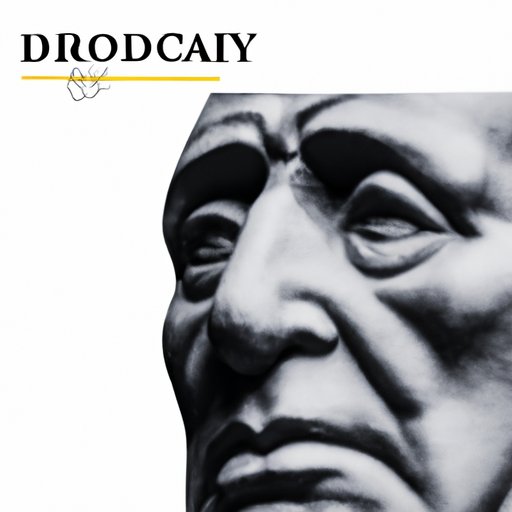Introduction
In today’s world, we hear a lot about the dangers and benefits of living under an autocratic ruler. Autocracy is a form of government in which one person holds all the power, making decisions for the entire society. It differs significantly from democracy, where citizens elect officials to represent their interests. While some argue that autocracy can provide stability and decisiveness, others point to its potentially disastrous consequences. This article aims to explore the meaning of autocracy, its pros and cons, and its effects on society. It also provides suggestions on how to address this problem.
Defining Autocracy
To understand autocracy, we must first define it. Autocracy refers to a system of governance in which one person has substantial power or authority over the people, making decisions without the consent of others. Unlike other forms of government, such as democracy, there is no separation of powers between the legislative, executive, and judiciary branches. In an autocracy, a single person holds all the power and makes all decisions.
Examples of historical autocracies include the Roman Empire under Julius Caesar and the Chinese Empire under Qin Shi Huang. Autocracies often share certain characteristics, including a lack of political freedoms or rights for citizens, a culture of obedience to authority, and centralized control of the economy. Proponents of autocracy argue that it can provide stability and decisiveness that is lacking in other forms of government, but critics contend that it can lead to abuse of power, corruption, and economic stagnation.
Autocracy in Practice
In contemporary times, we can see examples of autocracy in several countries around the world. North Korea and Eritrea are among the most authoritarian regimes, with leaders that have been in power for several decades. These rulers have severely limited political and civic freedoms for their citizens, harshly repressing dissent. Iran and Russia also have autocratic characteristics, with limited political freedoms and centralized control of the economy, despite being formally democratic states.
While autocracy can provide stability, it can also have serious impacts on the global community. For example, autocrats may strategically ally with other authoritarian regimes to further their own interests, rather than acting in the best interests of their citizens. This can lead to a lack of trust between nations and exacerbate tensions between countries, potentially leading to war.
Case studies demonstrate how autocracy can impact citizens. In Turkmenistan, a former Soviet republic, the autocrat Saparmurat Niyazov renamed days of the week and cities after himself, replacing the words for bread and mulberry with his name. His regime also summoned his family members into top government positions, effectively creating a hereditary autocracy. Additionally, the government has limited access to the internet and media, limiting people’s access to information and the freedom to express themselves. Turkmen citizens must deal with these restrictions in everyday life, but limited economic opportunities and lack of political freedoms make daily life difficult for them.
The Psychology of Autocrats
What drives someone to become an autocratic leader? Psychological studies suggest that autocratic leaders often share similar traits, including narcissism and personality disorders that drive a desire for power and control. These leaders often display a lack of empathy and disregard for human rights. They tend to view themselves as irreplaceable and may go to great lengths to maintain their power, even at the cost of destroying others.
Having an autocratic leader in power can have significant ramifications for a country, including further limiting free speech and civil liberties, and reducing citizens’ trust in political leaders and institutions. This can impact international relations, leading to decreased cooperation and increased tension between nations. In some cases, the impact of autocratic leaders can be felt globally, such as in cases where these leaders pursue aggressive foreign policies or create new alliances, potentially sparking conflicts.
The Effects of Autocracy on Society
Autocracy can have devastating effects on society. Autocrats may suppress freedom of thought, speech, and the press to maintain control over the public narrative. Additionally, autocrats often systematically persecute minorities and marginalized groups, fearing any potential opposition. This suppresses social diversity and can make daily life difficult for those who fall out of favor with the regime.
Autocrats frequently quash political dissent and opposition by using force, leading to a climate of fear and repression. This is especially damaging in the long term, as the people are left voiceless and unheard, leading to increased frustration and dissatisfaction. Autocratic leaders also limit access to economic opportunities, holding power over resources and businesses to benefit themselves and their families. This further entrenches their power while limiting progress and growth for the wider population.
Autocracy and Democracy
Comparing and contrasting autocracy with democracy provides a better understanding of the relative strengths and weaknesses of each system. While autocracy may provide stability, it often comes at the cost of civil liberties and human rights. Conversely, democracy can allow for more freedom, but can sometimes lead to political gridlock and inaction. It is up to individuals to decide which system they believe is best suited for their society.
The role of autocracy in global politics remains a topic of concern. Some argue that in the face of current challenges, such as the COVID-19 pandemic and climate change, an autocrat’s decisiveness may be necessary. However, others contend that this could come at the expense of human rights and freedoms and could exacerbate existing problems.
Conclusion
Autocracy poses unique challenges to our world and requires thoughtful consideration. Understanding the impacts of autocratic rule on society and the world is crucial for citizens and policymakers alike. Addressing autocracy is an ongoing process, requiring unwavering commitment to democratic values and institutions. By promoting and protecting these values, we can work together to diminish the impacts of autocratic rule and build a more just and equitable world.
